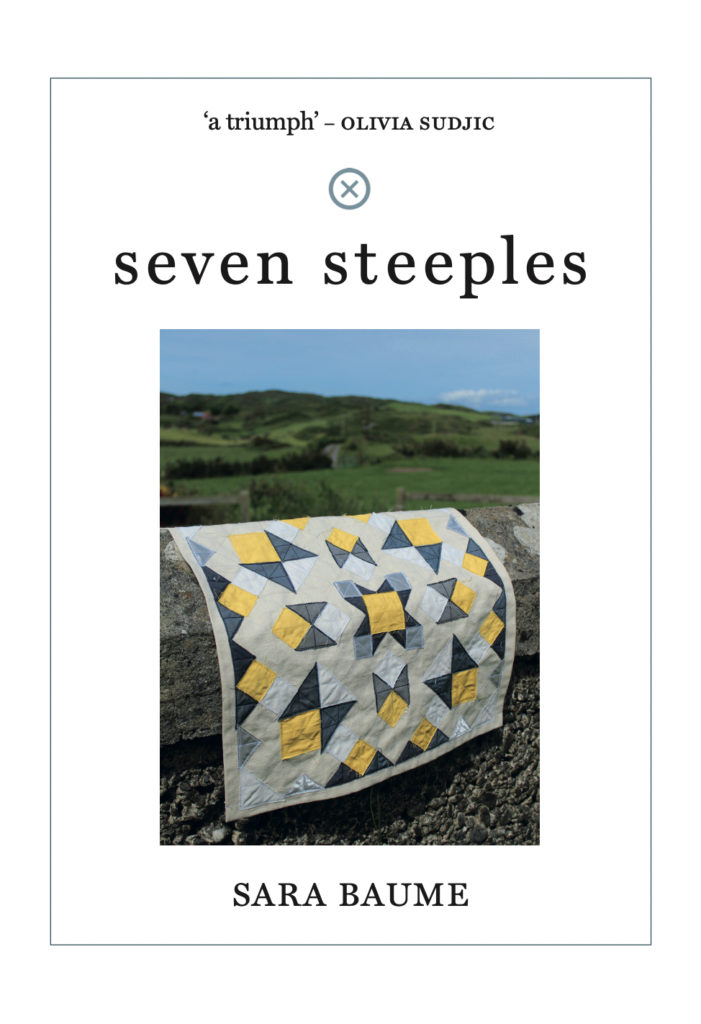Published last month by Tramp Press, Sara Baume’s latest novel imagines what life might look like if you pretended the rest of the world wasn’t there, writes Abi Andrews.

In Sara Baume’s novel Seven Steeples, a new couple, Bell and Sigh, move into a rural rental property with their respective dogs, Pip and Voss, cutting themselves off from their previously separate lives. Their new home is beneath the watchful eye of an outcrop that is ‘greater than a hill / but smaller / than a mountain’, but which they come to know between them as the mountain. The mountain is a sentinel that stands over their small world. The narrative voice is spectacularly attentive to the minutiae of their lives, the detail filmic and precise, testament to Baume’s practice as a visual artist. The omniscient voice that watches Bell and Sigh, and the eyes in the landscape that appear in motif, make it seem that it is the mountain itself that is narrating them.
The narrator, or perhaps the mountain, places Bell and Sigh firmly in a world of mundane objects, other living beings, and the deeply flowing span of time. The twinned protagonists are only slightly more important to our attention than ‘loose threads, a clothes label, a hair tie, a bead,’ or the, ‘individual items of lawn squalor’, which move ‘like clock hands too / like the cows / like the cosmos.’ Time happens to Bell and Sigh in the same way it does these objects — they are all material getting gradually worn down. But as time wears them down, concurrently it builds them up — the patterns of their lives accumulate in the same manner in which their butter block gathers to itself ‘tendrils of broccoli, specks of uncooked couscous, breadcrumbs…dust and dog hairs.’
Bell and Sigh’s commitment to their small world is in conflict with their feelings towards that which falls outside the sphere of their hermitude. ‘They did not like to ask people for favours – the landlord, the farmer. Asking meant owing, in the long run.’ To Bell and Sigh, connection to the wider world looms in the form of debt — an oppressive connection that the pair do their best to slip away from. Bell and Sigh are theatrically misanthropic, and Seven Steeples imagines, in an exaggerated way, what life might look like if you just pretended that the rest of the world wasn’t there, refused its tyrannical neediness.
‘Bell and Sigh were curious to see what would happen when two solitary misanthropes tried to live together. A refuge, a cult, a church of two; this was their experiment’. Seven Steeples plays on what happens when such an experiment becomes habitual, half by accident. Handled elsewise, this question can easily get frustrating, but Bell and Sigh are endearing in the theatre of their misanthropy. They appear bewildered by their belief in their own performativity; ducking at the windows when a stranger passes their house, and wearing disguises to the supermarket. They are somewhat helplessly caught in the slipstream of their own habits — the myths and rituals a cult makes for themself.
‘Every evening as they walked, Bell and Sigh / repeated themselves, / extravagantly.’ They become, circling in their own orbit, two people who are more and more alike. Their life accumulates around them, settling on them like layer upon layer of silt on the bed of a still lake, and Baume conveys wonderfully the aesthetic principles of such stillness. ‘The words they had spoken to each other built up, and the millions of sentences that contained them’, ‘by their seventh year, they spoke in a dialect of their own unconscious creation.’ Rather than inertia, there is a magnitude to this cyclical build up, to the persistence of their stillness.
Baume’s prose is characteristically lilting and incantorary. Every chapter ends with an eye, and each new one opens with a repeated refrain — the number of years that have passed while Bell and Sigh have still not climbed the mountain — and satisfaction for the reader comes with the hailing of each repetition. In sharing in the comfort of Bell and Sigh’s world, there lingers an anxiety that there might be an interruption to their idyll, that the silt of their comfort might be disturbed. Seven Steeples touches poignantly then — albeit mutedly — on the precarity of renting, and of insisting on living slowly against, and outside of, consumer society. Bell and Sigh may be misanthropic, an ouroborus of two, but their story speaks to something very familiar and very human.
*
‘Seven Steeples’ is out now and available here (£11.15).